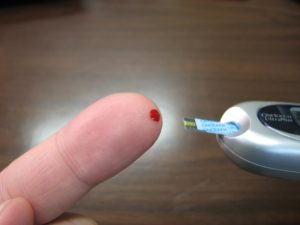Studies Show Low Carb Diets Improve Cholesterol
and discover
5 Ways Low Carb Lifestyles Help You To Lose Weight Without Starving

Low carbohydrate diets can help a person lose weight and can help a person maintain good health.
Carbohydrates and Cholesterol
One of the most common debates among dieticians is the role that carbs play in eating a healthy diet. Some dieticians believe that carbs aren’t essential for adequate nutrition and that it increases your risk of neurological disorders, cancer, and diabetes.
Others believe that we need to eat carbohydrates in order to have good health and that carbs should be a part of everyone’s diet, making up the majority of the calories we take in.
The scientific research shows some significant evidence that low carb is actually better than low fat in reducing markers and risk factors for heart disease, including in regards to the lipid profile.
How many carbs do we need?
According to the Institute of Medicine, every adult should take in at least 175 grams of carbohydrates per day, especially women who are pregnant. This represents about 29 percent of the calories taken in by a diet containing about 2400 calories. In pregnancy, it is recommended that proteins be restricted to less than 15 percent of calories consumed and that about 30 percent of the calories taken in should come in the form of carbohydrates.
Adrenal fatigue is another medical condition that requires moderate carbohydrate consumption. Adrenal fatigue happens when the adrenal glands are overworked so that cortisol levels are too low. Cortisol levels increase whenever a person adopts a low carb diet.
Carbs are recommended for athletes who train up to six days per week because carbs are the optimal source for cellular fuel in intense workouts and weight lifting for adequate performance.
Athletes who restrict carbs generally develop poor training habits and need to go on a diet that contains at least some carbohydrates for cellular fuel during exercise. Athletes should take in about 20 percent of their calories as carbohydrates. It depends, however, on the health goals of the individual, the individual’s weight, and on their training schedule. Those that exercise heavily need 40 to 50 percent of their calories from carbohydrates. They also need fat, which will be quickly metabolized by the body during a workout.

In short, low carbohydrate diets are not for everyone.
Though, even bodybuilders and other athletes can and do follow modified low carb diets, namely, the Cyclical Ketogenic diet and Targeted Ketogenic Diet, where carb intake fluctuates round workouts.
For the obese and those with overweight issues, a low carb diet can really serve 2 major purposes, to lose the weight AND keep it off.
Additionally, those with type 2 diabetes or prediabetes will also benefit from a low carb plan in stabilizing blood sugar levels, and significant weight loss, which can result in the reversal of type 2 diabetes. Type 2 diabetes mostly affects obese or overweight adults. These are people who need medical follow-up and dieting to get out of this vicious circle.
Prediabetes is called by the doctor “glucose intolerance”. If prediabetes is not well managed, it ends up in type 2 diabetes. But the ketogenic diet can reverse this problem.

How Low Carb Diets Work
Low carb diets restrict carb intake to as little as 20 grams per day, such as the case in the Ketogenic diet. This restriction prompts a metabolic process known as ketosis, where the body begins to burn body fat and dietary fat for fuel instead of dietary carbs, which turn into glucose fuel in the body.
Contrary to all the hype about fat, low carb diets are fat rich, and are primarily focused on a high intake of healthy fats, which in turn promote the body’s natural fat burning process.
But what about cholesterol?
What The Studies Show:
The Mayo Clinic states that a ketogenic diet has desirable effects on diabetes, heart disease, and metabolic syndrome and that eating a low carb diet is more effective in lowering bad HDL cholesterol than diets that are moderate in carbs.
While some studies have shown the intake of saturated fat to raise blood cholesterol levels, these studies are almost always short in duration, as little as a few weeks. In fact, several long-term studies have shown no association between saturated fat and high blood cholesterol levels.
Additionally, studies of low-carbohydrate high saturated fat diets suggest no impact on blood cholesterol and in fact lower markers for heart disease.
One study (Barclay AW, Petocz P, McMillan-Price J, et al. Glycemic index, glycemic load, and chronic disease risk–a meta-analysis of observational studies) concluded that using the glycemic index (GI scale that rates a food’s ability to impact blood glucose levels) to consume lower GI foods is associated with lower triglycerides and higher good HDL cholesterol profiles.
The first ever conducted Bayesian study (a summary approach to mass data that makes it easier for doctors to understand) of the effects of diet therapy on weight loss (Sackner-Bernstein, Kanter, Kaul) that was published in October of 2015 evaluated data from 17 randomized controlled trials of 1,797 people who were obese and overweight. The evaluation found greater weight loss and a reduced predictor of cardiovascular disease risk in subjects who ate low carb versus low fat. The studies leader, Dr. Sackner-Bernstein commented that the results showed a low carb diet to have a 99% probability of resulting in greater weight loss and a clear higher likelihood that it was superior to restricting fat.
One meta-analysis (Santos, et al; Systematic review and meta-analysis of clinical trials of the effects of low carbohydrate diets on cardiovascular risk factors) of 17 low carb diet trials comprised of 1,140 obese subjects determined that eating low carb neither increased nor decreased the bad LDL cholesterol.
Instead, low carb was associated with:
-
Significant weight loss and reduced body mass index
-
Significant improvements in several heart disease risk factors: lower level of triglycerides, healthier blood pressure
-
Improved fasting glucose
-
Reduced risk for metabolic syndrome, which is a risk factor for heart disease
-
Decreased levels of belly fat and waist size
-
Improvements in the good HDL cholesterol levels
Another study (Siri-Tarino, et al; Saturated Fatty Acids and Risk of Coronary Heart Disease) reported that the replacement of saturated fat with carbohydrates, and especially refined carbs and sugars that has become commonplace in the last several decades is associated with either no improvement in or increased risks for cardiovascular disease as well as higher risks for dyslipidemia.
The study’s researchers concluded that considering the current epidemic levels of obesity, and type 2 diabetes that features insulin resistance, reducing intake of carbs and sugar along with weight control should be a top priority in the public’s dietary goals.
Other Key Considerations
Moreover, no low carb diet advocates trans fats (also known as partially hydrogenated vegetable oil or hydrogenated vegetable oil) which are the worst fats contributing to an increased risk for heart disease.
Trans fats are typically found in fried foods, sweets, baked goods, processed snacks and food products, cookies, crackers and vegetable shortenings, none of which is allowed on any reputable low carb plan.

Now that you understand that the ketogenic diet could save you from diabetes or prediabetes, find out how nice this diet is and never make you starve.
5 Ways Low Carb Lifestyles Help You To Lose Weight Without Starving
Low carb diets are common in the weight loss spectrum. Many studies have shown them to result in more weight lost as compared to the standard low fat diet plan.
Going on a low carb diets has so many health benefits, including the fact that they are highly effective at eliminating visceral fat, such as that in the belly, a most dangerous type of body fat.
There have been so many speculations, thoughts and ideas on why low carb diets are effective for weight loss, hopefully this article will bring some clarity.
What Exactly Is A Low Carb Diet?
A low carb diet is a system of eating where carbohydrates are drastically or significantly, cut from the diet, and in the strictest plans, like the Ketogenic diet, carb intake is limited to non-starchy vegetables and some dairy. When ones diet contains fewer carbohydrates, the body no longer gets its energy from the glucose they produce and instead begins to burn fat for energy.
Starch and sugar carbohydrates are substituted with healthy fats and a moderate protein intake. Sugar, pastries, pasta, bread, cereal, beans, or any other starches are no longer allowed, as you will indulge vegetables, fatty foods such as butter, fatty fish, oils and some dairy along with eggs, steak, chicken, seafood and other protein sources.

How Does It Aid Weight Loss?
- Triggers Ketosis: Eating a low carb diet triggers a process known as ketosis, which is where the body begins to burn fat for energy instead of dietary carbs, which is a very efficient way to burn fat stores and lose weight.
- Eliminates water weight: People who have gone on low carb diet typically lose quite a bit of weight in the first two weeks, likely, this occurs when water that is tied to glycogen comes off the body and is actually a quite encouraging event that supports the continuation of a healthy lifestyle.
- Eliminates insulin trigger foods: Starch and sugar carbs are insulin triggers that cause blood sugar spikes that lead to weight gain. While on a low carb diet, these insulin triggers are eliminated so the body can burn fat instead of storing it.
- They are high in protein: Protein helps keep you full and satisfied so you naturally eat less, it also helps to increase lean muscle mass that promotes fat burning. This is one of the factors that make low carb diets effective.
- Regulates the appetite and naturally reduces calorie intake: A low carb diet naturally regulates the appetite because all those insulin triggers foods that wreak havoc in the blood stream to cause erratic hunger and out of control cravings are eliminated.

Through all these positive factors for your body, your body will begin to eliminate bad fats very quickly and this will be very motivating for you. And this without you hearing your stomach gurgling.
Additionally, Researches from St. Louis and Japan (Banks WA1, Coon AB, Robinson SM, Moinuddin A, Shultz JM, Nakaoke R, Morley JE, et all) found that the hunger regulating hormone leptin is positively affected by the low carb diet’s ability to reduce triglyceride levels in the body, which allows that hormone to work more effectively in regulating the appetite.
When people embark on a low carb diet, their appetite significantly drops naturally, and they naturally feel satisfied with less food, resulting in weight loss as they naturally eat less calories and without suffering and starvation. It’s a virtuous circle for lasting and successful weight loss.
Are Low Carb Diets Safe?
This is a frequently asked question, which is common amongst people wanting to embark on a low carb journey. The low carb experience is not for everyone, though it is followed by thousands of people around the world, without any problems.
It may have side effects for some, while others may experience nothing. Usually any side effects are short lived. In general, statics and research shows them to be highly effective for weight loss, and to also reduce risks for cardiovascular disease better than low fat eating plans.
Make sure you understand what a particular low carb diet has to offer before choosing it.
Final Thoughts
In conclusion, you should talk with your doctor before altering your diet, especially if you suffer from heart disease or high cholesterol. A nutritionist or a dietician can help as well.
Low carb diets aids weight loss by triggering ketosis, a metabolic state where the body uses stored fat as its source of energy.
Low carb diets also do a great job of regulating appetite and naturally allow those following them to eat less, while feeling satisfied and this is another one of the main reasons that the weight loss is so strong and visible.
Low carb diets are not fads, but lifestyles that have helped thousands of people reverse obesity and improve their health. It may just do the same for you.
Stay well and take care!

















